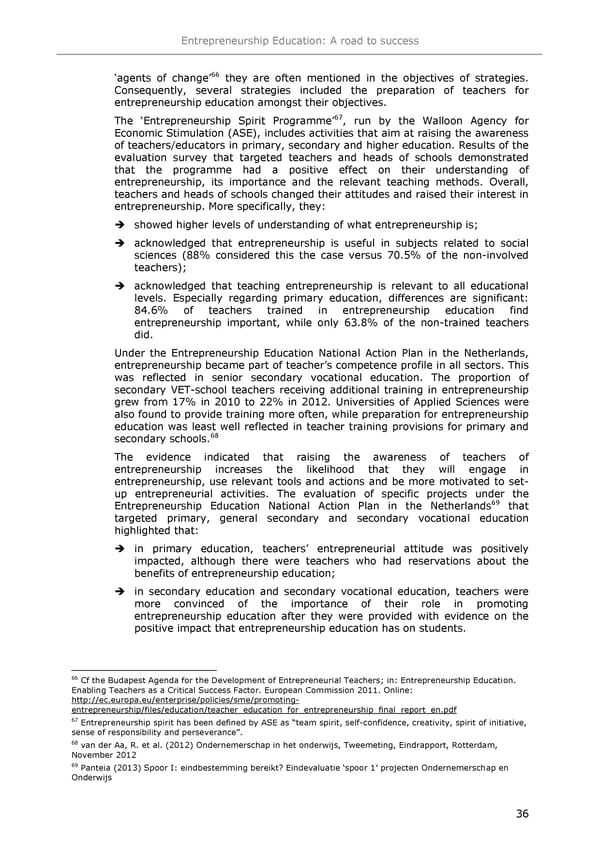Entrepreneurship Education: A road to success 66 8agents of change9 they are often mentioned in the objectives of strategies. Consequently, several strategies included the preparation of teachers for entrepreneurship education amongst their objectives. The 8Entrepreneurship Spirit Programme967, run by the Walloon Agency for Economic Stimulation (ASE), includes activities that aim at raising the awareness of teachers/educators in primary, secondary and higher education. Results of the evaluation survey that targeted teachers and heads of schools demonstrated that the programme had a positive effect on their understanding of entrepreneurship, its importance and the relevant teaching methods. Overall, teachers and heads of schools changed their attitudes and raised their interest in entrepreneurship. More specifically, they: showed higher levels of understanding of what entrepreneurship is; acknowledged that entrepreneurship is useful in subjects related to social sciences (88% considered this the case versus 70.5% of the non-involved teachers); acknowledged that teaching entrepreneurship is relevant to all educational levels. Especially regarding primary education, differences are significant: 84.6% of teachers trained in entrepreneurship education find entrepreneurship important, while only 63.8% of the non-trained teachers did. Under the Entrepreneurship Education National Action Plan in the Netherlands, entrepreneurship became part of teacher9s competence profile in all sectors. This was reflected in senior secondary vocational education. The proportion of secondary VET-school teachers receiving additional training in entrepreneurship grew from 17% in 2010 to 22% in 2012. Universities of Applied Sciences were also found to provide training more often, while preparation for entrepreneurship education was least well reflected in teacher training provisions for primary and secondary schools.68 The evidence indicated that raising the awareness of teachers of entrepreneurship increases the likelihood that they will engage in entrepreneurship, use relevant tools and actions and be more motivated to set- up entrepreneurial activities. The evaluation of specific projects under the Entrepreneurship Education National Action Plan in the Netherlands69 that targeted primary, general secondary and secondary vocational education highlighted that: in primary education, teachers9 entrepreneurial attitude was positively impacted, although there were teachers who had reservations about the benefits of entrepreneurship education; in secondary education and secondary vocational education, teachers were more convinced of the importance of their role in promoting entrepreneurship education after they were provided with evidence on the positive impact that entrepreneurship education has on students. 66 Cf the Budapest Agenda for the Development of Entrepreneurial Teachers; in: Entrepreneurship Education. Enabling Teachers as a Critical Success Factor. European Commission 2011. Online: http://ec.europa.eu/enterprise/policies/sme/promoting- entrepreneurship/files/education/teacher_education_for_entrepreneurship_final_report_en.pdf 67 Entrepreneurship spirit has been defined by ASE as
 Entrepreneurship Education Page 39 Page 41
Entrepreneurship Education Page 39 Page 41